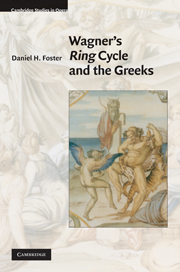Book contents
- Frontmatter
- Contents
- List of musical examples
- Preface
- Acknowledgments
- Introduction
- Part I Epic
- 1 Introduction: what is epic?
- 2 Retrospective narrative and the epic process
- 3 The orchestral narrator and elementary epic
- 4 Spiritual and factual realities in epic
- Part II Lyric
- Part III Drama
- Epilogue: Time, the Ring, and Performance Studies
- Appendices: Wagner's primary and secondary sources
- Notes
- Bibliography
- Index
4 - Spiritual and factual realities in epic
from Part I - Epic
Published online by Cambridge University Press: 07 May 2010
- Frontmatter
- Contents
- List of musical examples
- Preface
- Acknowledgments
- Introduction
- Part I Epic
- 1 Introduction: what is epic?
- 2 Retrospective narrative and the epic process
- 3 The orchestral narrator and elementary epic
- 4 Spiritual and factual realities in epic
- Part II Lyric
- Part III Drama
- Epilogue: Time, the Ring, and Performance Studies
- Appendices: Wagner's primary and secondary sources
- Notes
- Bibliography
- Index
Summary
Because both Hegel and Wagner believed that epic relies on meaningfully recognizable representations of reality, they further believed that this creates serious problems for any modern trying to read, let alone revive, an ancient epic. Demonstrably, the references to Nordic mythology in one of Wagner's central epic sources, the Nibelungenlied, were not immediately relevant, understandable, and/or meaningful to many of his listeners. It was almost certainly the case that when Wagner first began writing the Ring, as far as his German audience was concerned, its characters and stories came from “a misty Nordic world about which it knew nothing and cared even less.” In his effort to influence German national identity through the use of this “misty Nordic” epic, Wagner therefore had to find a way to make it vital to his audience. Nineteenth-century Germany did not inhabit the same factual and spiritual reality described in the Norse sagas, myths, and epics. It neither worshiped the same gods nor upheld the same laws and customs. As Hegel caustically notes of the Nibelungenlied, any attempt to use its pagan Germanic myths, gods, and cultural references to depict reality for a nineteenth-century audience would have been an absurd and childish endeavor. The links between nineteenth-century Germans and their primeval Germanic myths had long been severed:
The Burgundians, Chriemhild's revenge, Siegfried's deeds, the whole circumstances of life, the fate and downfall of an entire race, the Nordic character, King Etzel, etc., all this has no longer any living connection whatever with our domestic, civil, legal life, with our institutions and constitutions. […]
- Type
- Chapter
- Information
- Wagner's Ring Cycle and the Greeks , pp. 83 - 108Publisher: Cambridge University PressPrint publication year: 2010



